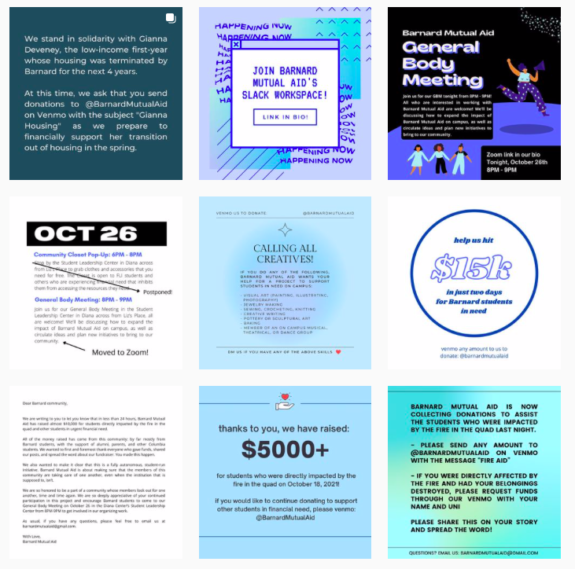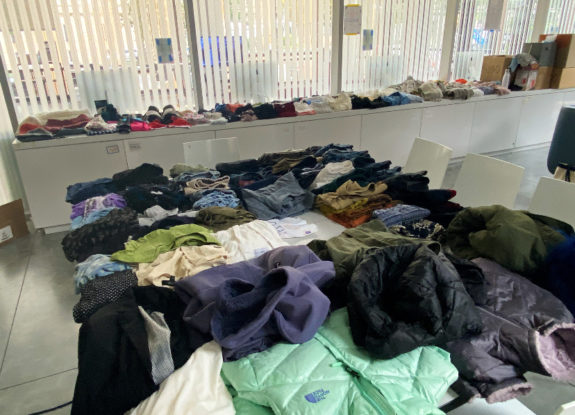Where the College falls short of supporting low-income students, Barnard Mutual Aid shows up to fill the gap.
If you’re a member of the Barnard community this year, you’ve likely heard of Barnard Mutual Aid. Whether you’ve noticed them from the flyers scattered around campus, or their wildly popular social media posts, the group has become one of the fastest-growing—and arguably most important—organizations on campus. Still, if you’re not directly involved with the organization, you may not be familiar with its remarkable story, or the essential service it provides to low-income students.
The idea for Barnard Mutual Aid first came to founder Avalon Zborovsky-Fenster (BC ‘24) in the fall of 2020, when, as a first-year, she noticed a recurring theme emerging in her conversations with fellow students. Again and again, she listened as peers described their struggles with increasing financial need as a result of the COVID-19 pandemic, and a lack of access they faced to resources at Barnard as a result. “Not having enough money for something doesn’t end there,” she explains. “It means not being able to take on an unpaid internship, not being able to buy food, not having transportation or access to basic necessities—it means not having access to a lot of the most important things the college has to offer.”
While the idea had been brewing for months, Zborovsky-Fenster’s brainchild came to fruition in July 2021. Realizing that financial need would only be exacerbated as students returned to campus in the fall, Zborovsky-Fenster decided to set up a fund to help support FGLI (first generation, low income) students on campus. Her initial hope was to raise a few hundred dollars, enough to provide even a small amount of support for a few low-income students who needed it most. Three days later, the fund had raised $2,000.
Still, while the fund’s explosion in popularity is overwhelming, Zborovsky-Fenster says it’s also bittersweet. “Students feel compelled to give to others,” she says, “even when they’re struggling, because the systems that are in place to support them aren’t working the way they’re supposed to, or at least the way they’re credited to.”
Indeed, with this rapid influx of donations came an even greater influx of requests. In its first 24 hours, the fund had received over $3,000 in aid requests. In early August, as the tuition deadline grew closer, this number fast approached $6,000. As requests streamed in, two things became clear: students in financial need were not receiving the institutional assistance they needed from the College, and, in turn, the need for a network of community support was more urgent than ever.
In many ways, where institutional support for FGLI students stops, Barnard Mutual Aid fills in the gap. Students can—and do—request aid for everything from groceries and essentials to covering tuition costs, needs many assume are covered for low-income students by financial aid from the College. Using the fund is simple: through Venmo, students can request any amount of money by providing their name, UNI, and a few short sentences explaining their circumstances. Zborovsky-Fenster and a team of organizers then redistribute funds based on the urgency of each request. Furthermore, the organizers ensure that while the available money in the fund is being redistributed, they are simultaneously raising additional donations to meet future student requests. On principle, Barnard Mutual Aid does not police or reject any requests; it only asks that students remain “personally mindful” and respectful of other requests, not taking more than they need. Donations similarly follow a principle that Zborovsky-Fenster describes as “give what you can, take what you need,” ranging anywhere from $1-$500. As a result, the fund has been able to raise nearly $30,000, and has helped hundreds of Barnard students with everything from small groceries to emergency expenses to rent and tuition payments. However, the fund is always in need of more donations in order to help cover the myriad of continuing expenses FGLI students face.

If the need for Barnard Mutual Aid was ever in doubt, it became especially apparent this month, in the aftermath of an accidental fire in Brooks Hall. The fire destroyed nearly all of the belongings of Gianna Deveney, an FGLI student who accidentally started the fire while working on a class project, and caused damage to the belongings of several students in surrounding rooms. While Barnard administration officials repeatedly published statements referring to the fire as “small” and the impact as “brief,” Zborovsky-Fenster says the low-income students who lost their belongings to the flames were left without support from the College to replace them. Out of necessity, they turned to Barnard Mutual Aid for assistance.
Within two days of the Brooks Hall fire, Barnard Mutual Aid had raised nearly $10,000 to replace the belongings of Deveney and others. By the end of the week, the fund had raised so much money that—with the consent of those impacted by the fire—organizers were able to redistribute excess donations to students who had submitted unrelated requests for aid. To Zborovsky-Fenster, this represented another striking difference between Barnard administration and the larger community. While community members quickly recognized the urgency of the situation and were eager to lend their support, Barnard’s response, Zborovsky-Fenster asserts, “minimized the intensity and significance of that situation and what happened to those students.” This split response between administration and the community became all the more apparent in the weeks following the incident, when, as many students were rallying to support Deveney in replacing her lost belongings, the College announced she would be permanently removed from Barnard housing as punishment for starting the fire. For many observers of the crisis, Barnard’s response represented a prime example of the College failing to support low-income students on an institutional level, despite promoting itself as a need-blind, FGLI-inclusive institution.
Meanwhile, in the aftermath of the fire, fellow students, alumni, and parents gathered together, accumulating hundreds of donations to Barnard Mutual Aid in support of the students whom the College had seemingly ignored. For Zborovsky-Fenster, this perfectly encapsulates the mission of Barnard Mutual Aid: building a consistent, reliable network of support for students in need. Still, while the community response to the crisis was deeply encouraging, she hopes that the energy and excitement around mutual aid and community care will continue past this moment. “There are constant financial crises in our community,” she explains, “and those stories are rarely highlighted in the same way.”
While Barnard Mutual Aid has already made a sizeable impact on the student community through monetary aid, the group’s latest initiative, the Barnard Community Closet, aims to expand its network of support to the redistribution of other essential resources, starting with clothes. The project operates through pop-ups where students can take as many clothing items as they need, with the goal of ensuring that all students have access to clothes that make them feel fashionable and comfortable without worrying about an insurmountable financial barrier. As Mariame Sissoko (BC ‘24), an organizer behind the initiative, explains, “Clothing insecurity is very real here, and for FGLI students, it gets difficult to find clothing and feel stylish.”
The idea first emerged when Zborovsky-Fenster was processing aid requests and noticed that one student had requested funding to purchase their first winter coat. “It immediately clicked,” she recalls. “We need to be providing free clothes that students need and would still like to wear.” Like its finance-based counterpart, the community closet project aims to provide an essential resource to students in need with discretion and dignity. To uphold this mission, organizers have made sure the Barnard Community Closet only holds pop-up events in locations that both assure anonymity and discourage students who are not struggling with financial need from using the closet as a thrift shop.

At the same time, the organizers behind Barnard Mutual Aid have continually emphasized that they want the fund to be a resource for the entire Barnard community, and encourage any student experiencing any level of financial need to submit a request or visit the Community Closet. As Sissoko explains, an invisible obstacle for those who may need the support of Barnard Mutual Aid is the sense of imposter syndrome that can stem from being a low-income student at an institution like Barnard; “We perpetually imagine this invisible other who needs these resources more than us.” To combat this stigma, on October 9, shortly before the Community Closet’s first pop-up event, Barnard Mutual Aid published an open letter, written by Sissoko, containing a powerful message to all students in need: “Barnard Mutual Aid sees you, and we are here for you.”
Reflecting on the letter, Sissoko explains, “a tenet of mutual aid is to know you safely have a community that you can go back to at any time.” For Barnard Mutual Aid, part of creating this community is ensuring that the resources they provide are accessible to every student in need.
Looking to the future, the organizers of Barnard Mutual Aid hope the organizing body continues to expand, eventually becoming a non-hierarchical, diverse representation of the student population that is, as Zborovsky-Fenster describes, “ingrained enough in the community to keep a finger on the pulse of what the community actually needs.” Organizers are currently reaching out to students interested in fundraising or organizing community closet events, as well as to creatives in the Barnard community. The group’s hope is to expand its pop-ups to community events that both raise interest in and donations for the fund and provide the Barnard community with opportunities to come together.
In an immediate sense, the organizers of Barnard Mutual Aid want the fund to be able to provide support to any student who needs it. In the future, they hope to see Barnard Mutual Aid contribute to a larger cultural shift toward community care, becoming what Zborovsky-Fenster calls a “long-term, self-sustaining student-run initiative,” as deeply ingrained in the Barnard community as many of the College’s institutional resources. Describing her ideal vision for the group’s future, Zborovsky-Fenster says, “I want Mutual Aid to still be here after I graduate. I want it to be here long after any of us graduate. I hope that once I’m gone, there will be a solid enough infrastructure for the organization and initiative that students can always trust that what they need will be available to them.”
Of course, in an ideal world, “Barnard Mutual Aid wouldn’t have to exist,” says Sissoko, because the College would be providing enough support to FGLI students on its own. Until then, you can expect to see Barnard Mutual Aid showing up to fill the gap.
You can follow Barnard Mutual Aid on Instagram @the116thinitiative for updates on fundraising and the Community Closet, and you can submit donations or requests to @the116thinitiative on Venmo.
Students can also volunteer with the organization by emailing 116thinitiative@gmail.com for more information
Editor’s note: Details in this article have been updated to include more up-to-date information about Barnard Mutual Aid, now called The 116th Initiative.
All photos via @the116thinitiative on Instagram


 0 Comments
0 Comments